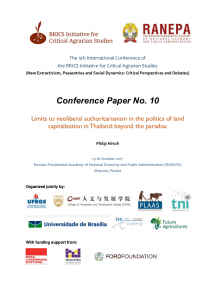Limits to neoliberal authoritarianism in the politics of land capitalization in Thailand: Beyond the paradox
Thailand presents a number of apparent paradoxes that complicate linear assumptions about the< capitalization of land and consequent processes of accumulation, dispossession and concentration.

Download PDF
These become particularly apparent when current conundrums are understood in their longer-term historical and wider regional contexts. Historically, capitalization through market-oriented intensification and commercialization, through establishment of transferable property rights in land and through financialization have been tempered both by state policy and by space for counter- movements that have helped maintain a largely smallholding pattern of agriculture. Geographically, Thai capital has invested in large scale land deals across borders rather than within its own territory, both in response to the above limits within Thailand and to opportunities established in neighbouring countries whose authoritarian regimes follow post-socialist neoliberal development paths. The present situation of land capitalization and accumulation within Thailand is complicated by a resurgence of authoritarianism and a complex pattern of competitive populism emanating from different quarters, as well as by the gap between partial de-agrarianization, on the one hand, and a rural identity politics that is central to the current political impasse.